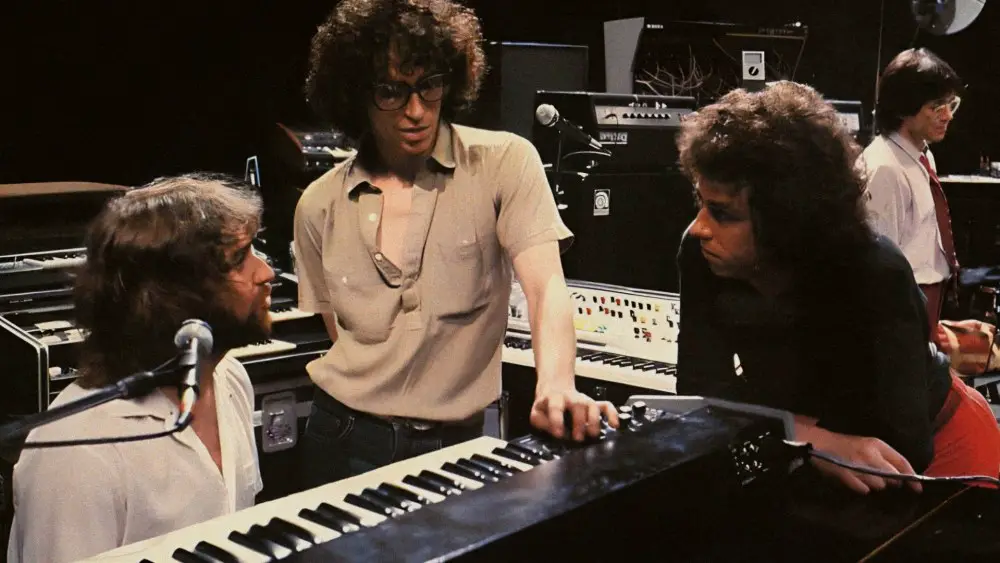Ask two music fans what constitutes yacht rock, and you’re sure to get a debate.
Does Steely Dan count? (Of course.) What about Hall & Oates? (No, even the East Coast.)
In the late 1970s and early 80s, the term “yacht rock” didn’t yet exist. But everyone knew the music of the Doobie Brothers, Toto, and Christopher Cross. They took the 1980 Grammys by storm with their shimmering ballad “Sailing.”
These artists topped the charts at a time when slick production, smooth melodies and deft chops ruled the radio waves alongside the country-tinged hits of the Eagles. That all changed when MTV crashed the scene. Suddenly, songs like “What a Fool Believes” and “Africa” were relegated to the uncool “soft rock” pile. After the rise of Madonna and Michael Jackson, some early musicians moved into soundtracks, like Kenny Loggins with the Top Gun hit “Danger Zone.”

Michael McDonald became a mainstay of yacht rock, singing and occasionally playing keyboards with Steely Dan, the Doobie Brothers, Toto, Kenny Loggins, and Christopher Cross.
HBO
More than 20 years later, in 2005, comedians JD Reisner and Steve Huey retroactively coined the term for the genre with their tongue-in-cheek web series Yacht Rock. With a lo-fi aesthetic, the show reimagined musicians like Kenny Loggins and Jimmy Buffett struggling to create a jazz sound that perhaps evoked a cocaine-fueled yacht party. Naturally, the music itself plays a big role in each episode. The series ultimately sparked a renaissance in yacht rock, spawning three Sirius XM stations and tribute bands like Yachtley Crew.
One Gen X convert is director Garrett Price, whose film “Yacht Rock: A Documentary” premieres Friday as part of HBO’s Music Box series. Price previously ventured into dark stories with another installment in the series, “Woodstock ’99.” This time, he wanted to explore bright moments in music history and how the oldies that his parents loved came to find a new, younger fan base.
“People always romanticize the Eagles and Fleetwood Mac and Carly Simon, the troubadour scene,” says Price, editor of the Prime Video miniseries “Daisy Jones and the Six.” “But there’s a whole other scene going on with Michael McDonald, Christopher Cross, Steely Dan and the members of Toto that I don’t think is recognized as much.” Say.
Coincidentally, Price had recently met Cross’ daughter. Cross happened to be best friends with former Doobie Brother Michael McDonald’s daughter. Madison Cross originated the idea for the doc and told Price that her father was not a fan of the nickname, but that Michael McDonald thought it was funny.
Mr. Price decided to interview some of Yacht Rock’s leading figures to find out how they felt about Yacht Rock. “I always wanted to stick to Mount Rushmore, Steely Dan, Michael McDonald, Christopher Cross, Kenny Loggins and Toto,” he says.
Cross says he initially found the newly invented phrase “a little kitschy.” But now, the “Ride Like the Wind” singer says, “Anything that brings some lightness to this world, I’m happy to take on.”

“Sailing” singer Christopher Cross says he thought the term “yacht rock” was kitschy at first, but has since come to appreciate it.
HBO
Price said most of the other members agreed. “They’re back. They understand that this is giving their music a second life and introducing them to a lot of new fans.”
Any exceptions? Fagen, a notorious grump and co-founder of Steely Dan, initially resisted his invitation.
A few months later, longtime Steely Dan manager Irving Azoff told Price he expected to get a call from Fagen in the next few weeks. “Prepare to record,” Azov told him.
Eventually Fagen called and Price asked if he wanted to be part of the documentary, explaining that it was about “yacht rock.” As shown in the film, the response was short, profane, and 100% pure Fagen.
He may not have wanted to be on camera, but at the same time he licensed all his music to me. So I think it’s kind of a wake-up call,” Price says.
Why is the inclusion of Steely Dan in this genre so controversial?
“I think it’s hard for people to conflate the guy who wrote ‘Sailing’ with the guy who wrote ‘Peg,'” says Price, whether we should associate the cerebral Steely Dan with the soft rock of Cross and Poco. He said this while referring to the discussion. .
Whatever their feelings about the late label, Price’s Mount Rushmore bands share a common DNA. “It’s basically rooted in R&B, soul, funk, jazz, black music, and it was all done in Southern California within an ecosystem of studios with session guys,” he says.
And the band continues to be influential. Contemporary artists like Questlove, Thundercat, and Mac deMarco document how these jazzy pop tunes influenced their sound. Thundercat also scouted McDonald and Loggins for their 2017 song “Show You the Way.”
“These are white musicians who were influenced by black music. They were trying to take what they liked and create a new kind of pop music era,” Price says. “When hip-hop discovered this music in the late ’70s, it was very exciting to start sampling with revolutionary artists like De La Soul and Warren G who were into this kind of funky side of this music. It makes sense.”
It’s fitting, he says, that “Yacht Rock” premieres the day after Thanksgiving, when families may be looking for intergenerational entertainment.
“Yes, there’s humor in it, but there’s also respect and love and respect.”
